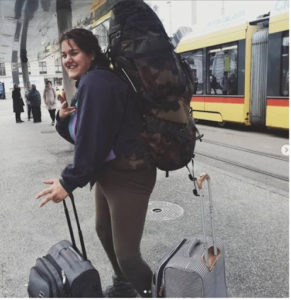Are you looking to take your next big step as a writer? Here are a few tips for making your mini collection of poetry.
By Jenna Murray
 Throughout my time at SUNY Geneseo, I have grappled with the aspiration of creating a collection of my work that reflects how I have grown as a writer. After speculating the many ways I could present my work to my community, with the workload of an undergraduate student on my back, I decided the best avenue would be to write a chapbook.
Throughout my time at SUNY Geneseo, I have grappled with the aspiration of creating a collection of my work that reflects how I have grown as a writer. After speculating the many ways I could present my work to my community, with the workload of an undergraduate student on my back, I decided the best avenue would be to write a chapbook.
A chapbook is a small book containing ballads, poems, tales, or tracts. Historically, chapbooks were first introduced as an alternative to the expensive, inaccessible book of the late 16th century—these unbound books of 8-12 pages cost less than a penny to purchase. Though the same can not be said of contemporary chapbooks, the exact value of accessibility stands. No matter what kind of poet you are, no matter how far along in your poetic journey you are, you can easily create a chapbook to share with your peers.
Through a directive study, which I decided to title “Crafting a Chapbook,” I read through contemporary chapbooks, analyzed the structure and critical poetic techniques within, and was able to create my very own 40-page chapbook by the end of the semester.
For any writer looking to make their next big move throughout their poetic journey, creating a chapbook—whether it be 40 pages, 20-30 pages, or as small as ten pages—is a perfect window into the concept of the poetic collection. Whereas some chapbooks may be based around certain thematic elements, such as motherhood, or a series of specific events, many chapbooks do not need a firm structure and can function within spaces of lyricism and spontaneity alone.
After gaining all this insight throughout the semester, I understood the production of a chapbook very well. Though there is no one way to create a chapbook, as creative pursuits such as this should not be defined by structure, I found my course plan extremely effective and wanted to share those steps below, should they help any poets in their future endeavors.
No matter what it is you envision for your future poetic chapbook, there is a space for all creatives within contemporary poetry—so, please take these steps and tips with both an open mind and an awareness of what works for you!
Continue reading →
 Book banning was a thing of the past. Something that you read about in the history books
Book banning was a thing of the past. Something that you read about in the history books








